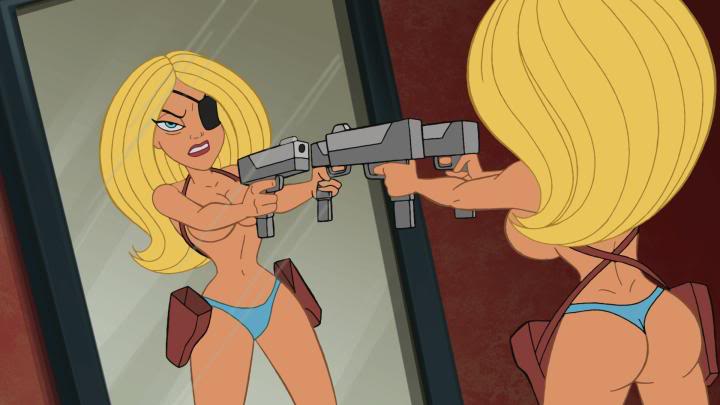 ★★★★
★★★★
“Suzi-X Marks The Spot.”
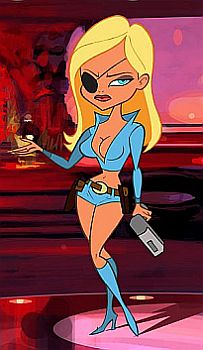
 Rob Zombie has had an interesting career, to say the least. From the early days as the front-man of heavy-metal band White Zombie, through his own solo work [heavily influenced by B-movies], and then on into his movies. That started with the fairly-crap House of 1000 Corpses, then the better Devil Rejects, and then his remakes of the first two Halloween movies, which were ok, as remakes of horror classics go. And then there’s The Haunted World of El Superbeasto, an animated feature which I stumbled across on cable. Well, actually, Chris did: “I Tivo’d a movie for you,” she said. And, surprisingly, she stayed for the entire thing, and appeared to enjoy this animated feature. Which is odd, because it has much the same gleeful, excessive insanity as Bitch Slap, which she walked out on.
Rob Zombie has had an interesting career, to say the least. From the early days as the front-man of heavy-metal band White Zombie, through his own solo work [heavily influenced by B-movies], and then on into his movies. That started with the fairly-crap House of 1000 Corpses, then the better Devil Rejects, and then his remakes of the first two Halloween movies, which were ok, as remakes of horror classics go. And then there’s The Haunted World of El Superbeasto, an animated feature which I stumbled across on cable. Well, actually, Chris did: “I Tivo’d a movie for you,” she said. And, surprisingly, she stayed for the entire thing, and appeared to enjoy this animated feature. Which is odd, because it has much the same gleeful, excessive insanity as Bitch Slap, which she walked out on.
Based on a comic-book series, the focus is, at least, theoretically, El Superbeasto (Papa), a masked luchador and part-time exploitation film-director, whose opinion of his own talents is certainly not modest. Superbeasto gets involved with the the evil plans of Dr. Satan (Giamatti), who kidnaps foul-mouthed stripper Velvet Von Black (Dawson), because if he marries her, he’ll get all the powers of the devil. El Superbeasto and his sister Suzi X (Moon Zombie) have to stop Dr. Satan, before he can destroy the world. And it’s thanks to the latter that this film effortlessly slides into GWG territory. Imagine a soft(ish) porn version of those insurance ads with Erin Esurance kicking butt. Except, with far larger breasts, much more gore and a sidekick of a horny, transforming robot. Er, ok: not really like those insurance ads at all, then.
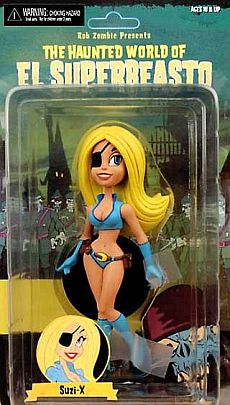 Zombie was responsible for the Werewolf Women of the SS faux-trailer in Grindhouse, and brings much the same gleeful approach to proceedings here. Indeed, we first see Suzi-X kidnapping the head of Hitler, which is kept alive in a jar (as in They Saved Hitler’s Brain), and then has to escape by fighting her way through a massive pack of Nazi zombies (that’d be from Shock Waves). Carnage ensues, as it pretty much does, any time Suzi-X is on the screen, which is a lot – she gets far more of the action than El Superbeasto does. Proceedings culminate in a lengthy, slo-mo catfight, entirely necessary to the plot, between her and Von Black, while the soundtrack cheerily informs us that “It’s OK to jerk off to cartoons – the Japanese do it every day – so rub one out for the USA…”
Zombie was responsible for the Werewolf Women of the SS faux-trailer in Grindhouse, and brings much the same gleeful approach to proceedings here. Indeed, we first see Suzi-X kidnapping the head of Hitler, which is kept alive in a jar (as in They Saved Hitler’s Brain), and then has to escape by fighting her way through a massive pack of Nazi zombies (that’d be from Shock Waves). Carnage ensues, as it pretty much does, any time Suzi-X is on the screen, which is a lot – she gets far more of the action than El Superbeasto does. Proceedings culminate in a lengthy, slo-mo catfight, entirely necessary to the plot, between her and Von Black, while the soundtrack cheerily informs us that “It’s OK to jerk off to cartoons – the Japanese do it every day – so rub one out for the USA…”
Yeah, the soundtrack. By comic due Hard ‘n’ Phirm, it’s certainly worthy of note, providing a sardonic commentary throughout. Witness the play-by-play as Suzi-X takes on the Nazi zombies, or as it bemoans the shameless ripoff of Carrie which is the finale. An appreciation of genre – particularly, horror movies – of the past eighty years or longer, will also help, as will as realizing this is not to be taken at all seriously. It’s definitely not for kids, or the easily offended: copious female nudity, violence, swearing and generally questionable attitudes. It reminded me of Ralph Bakshi cartoons, such as Fritz the Cat, just much more tongue-in-cheek.
If anything, it may be a little too hyper and frenetic. We ended up taking a break in the middle, and chilling out with coffee and muffins before returning for the second-half. Throwing together everything but the kitchen sink as far as style, content and approach goes, it remains a thoroughly entertaining piece of trash cinema. While the supposed hero is actually not very interesting, and largely unlikeable, Suzi-X is a fabulous action heroine, whom I’d enjoy seeing more of [not that there’s much you don’t see of her here, if you know what I mean, and I think you do…] Check out the clip below for some idea of what to expect.
Dir: Rob Zombie
Star (voice): Tom Papa, Sheri Moon Zombie, Paul Giamatti, Rosario Dawson





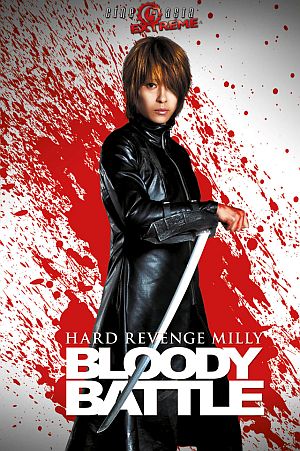 In the near(ish) future, Japan has become a post-apocalyptic wasteland in which only the strong survive. Initially, that does not include Milly (Mizuno), who is tortured by the Jack brothers and their gang: her baby is set on fire, while she has her breasts sliced off and is left for dead. However, she survives, albeit in a partially-mechanical form, and has now devoted her life to revenge on those responsible. Her artificial enhancements include a shotgun leg, a sword up her sleeve and a chest that… Well, that has to be seen to be believed, let’s just leave it at that, shall we? That’s Hard Revenge Milly, the first of the two films on the Western release DVD.
In the near(ish) future, Japan has become a post-apocalyptic wasteland in which only the strong survive. Initially, that does not include Milly (Mizuno), who is tortured by the Jack brothers and their gang: her baby is set on fire, while she has her breasts sliced off and is left for dead. However, she survives, albeit in a partially-mechanical form, and has now devoted her life to revenge on those responsible. Her artificial enhancements include a shotgun leg, a sword up her sleeve and a chest that… Well, that has to be seen to be believed, let’s just leave it at that, shall we? That’s Hard Revenge Milly, the first of the two films on the Western release DVD.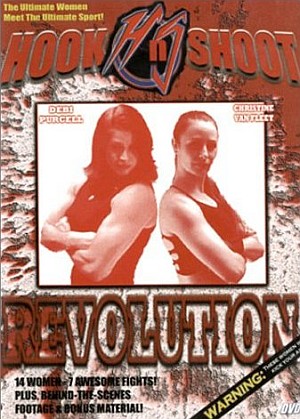 These days, the notion of women participating in mixed martial-arts is no longer seen as particularly outlandish, with names like Tara LaRosa, Yuka Tsuji and Megumi Fujii among the top fighters [as with pro wrestling, the best fighters are out of Japan]. However, this wasn’t always the case: In April 2002, in Evansville, Indiana, one of the first all-women events in America took place. The fights took place under
These days, the notion of women participating in mixed martial-arts is no longer seen as particularly outlandish, with names like Tara LaRosa, Yuka Tsuji and Megumi Fujii among the top fighters [as with pro wrestling, the best fighters are out of Japan]. However, this wasn’t always the case: In April 2002, in Evansville, Indiana, one of the first all-women events in America took place. The fights took place under 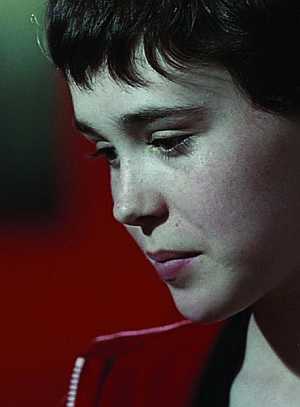 This is almost unbearably creepy, in two different directions: however, it’s almost impossible to discuss this film in any meaningful way without spoilers, so you have been warned. The danger of online predators is well-known, and when fourteen-year old Hayley (Page) agrees to meet photographer Jeff (Wilson), who is in his thirties, alarm bells are ringing. They reach a piercing level after she goes to his house, starts drinking vodka and flirting outrageously. However, the tables are abruptly turned: she’s spiked Jeff’s drink, and he wakes to find himself tied-up, and entirely at Hayley’s mercy. He soon finds out that’s a quality she is very definitely
This is almost unbearably creepy, in two different directions: however, it’s almost impossible to discuss this film in any meaningful way without spoilers, so you have been warned. The danger of online predators is well-known, and when fourteen-year old Hayley (Page) agrees to meet photographer Jeff (Wilson), who is in his thirties, alarm bells are ringing. They reach a piercing level after she goes to his house, starts drinking vodka and flirting outrageously. However, the tables are abruptly turned: she’s spiked Jeff’s drink, and he wakes to find himself tied-up, and entirely at Hayley’s mercy. He soon finds out that’s a quality she is very definitely  I think I can safely say that this films fails miserably on just about every level. Now, I am probably not the target audience for this unashamedly ‘urban’ movie, but that didn’t stop me from enjoying the works of Pam Grier. This, on the other hand… Three women (Brown, Nurse and Sha – though I’ve my suspicions that one of them might just be a man) are arrested under dubious circumstances, but are bailed out to investigate the murder of one’s brother, a rising rapper. They get employed at his record-label, the questionably-spelled Murda Boi records, to scope out the suspects. Was it his partner in the label? The sleazy CFO? Or the mail-room man?
I think I can safely say that this films fails miserably on just about every level. Now, I am probably not the target audience for this unashamedly ‘urban’ movie, but that didn’t stop me from enjoying the works of Pam Grier. This, on the other hand… Three women (Brown, Nurse and Sha – though I’ve my suspicions that one of them might just be a man) are arrested under dubious circumstances, but are bailed out to investigate the murder of one’s brother, a rising rapper. They get employed at his record-label, the questionably-spelled Murda Boi records, to scope out the suspects. Was it his partner in the label? The sleazy CFO? Or the mail-room man?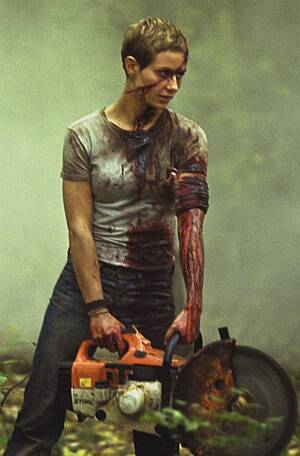 This Thanksgiving viewing – that may say more about our house than anything – was a suggestion by our teen daughter, which is somewhere between a incentive and a put-off. Normally, she won’t view anything with subtitles for more than two minutes; but her tastes are closer to Anchorman or The Notebook than French slasher pics. Reviews I read in advance were similarly split: either enthusiastic hype (“arguably the best horror movie since The Blair Witch Project” wrote
This Thanksgiving viewing – that may say more about our house than anything – was a suggestion by our teen daughter, which is somewhere between a incentive and a put-off. Normally, she won’t view anything with subtitles for more than two minutes; but her tastes are closer to Anchorman or The Notebook than French slasher pics. Reviews I read in advance were similarly split: either enthusiastic hype (“arguably the best horror movie since The Blair Witch Project” wrote 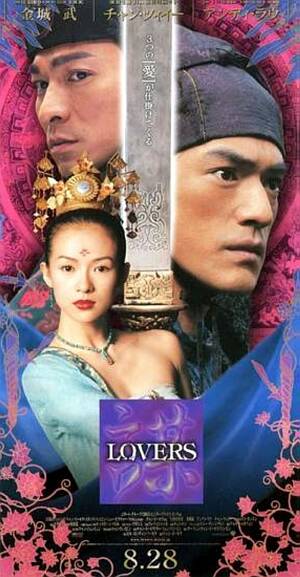 Since the success of Ang Lee’s Crouching Tiger, fellow arthouse director Zhang Yimou seems to have become obsessed with one-upping Lee. First was Hero, a sumptuous and multi-levelled tale of revenge and betrayal starring Jet Li; now, we get House which while slightly smaller in scale, is clearly going for the same tragically romantic feel as CTHD. Policeman Leo (Lau) suspects Mei (Zhang), an arrested blind prostitute, is part of the titular rebel group, so sends Jin (Kaneshiro) to win her confidence by helping her ‘escape’, then going with her to the Flying Daggers’s base. However, it gives nothing away to say that Mei and Jin start having feelings for each other, as they battle through the countryside, and it’s no surprise to discover that several other characters aren’t what they seem either.
Since the success of Ang Lee’s Crouching Tiger, fellow arthouse director Zhang Yimou seems to have become obsessed with one-upping Lee. First was Hero, a sumptuous and multi-levelled tale of revenge and betrayal starring Jet Li; now, we get House which while slightly smaller in scale, is clearly going for the same tragically romantic feel as CTHD. Policeman Leo (Lau) suspects Mei (Zhang), an arrested blind prostitute, is part of the titular rebel group, so sends Jin (Kaneshiro) to win her confidence by helping her ‘escape’, then going with her to the Flying Daggers’s base. However, it gives nothing away to say that Mei and Jin start having feelings for each other, as they battle through the countryside, and it’s no surprise to discover that several other characters aren’t what they seem either.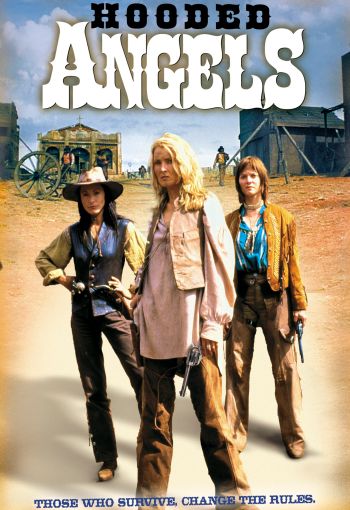

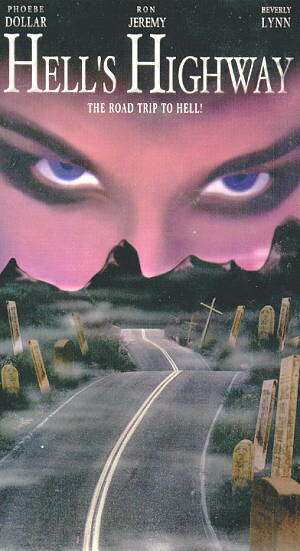 Chris’s chicken parmigiana is legendary here for its narcotic effect: eat it, fall asleep, simple as that. It thus perhaps means more than it seems that Hell’s Highway kept me awake, post-parmigiana. Sure, it’s cheap (cost about $5K, shot on video); sure, it’s dumb – but to counter that chicken, a film must have
Chris’s chicken parmigiana is legendary here for its narcotic effect: eat it, fall asleep, simple as that. It thus perhaps means more than it seems that Hell’s Highway kept me awake, post-parmigiana. Sure, it’s cheap (cost about $5K, shot on video); sure, it’s dumb – but to counter that chicken, a film must have